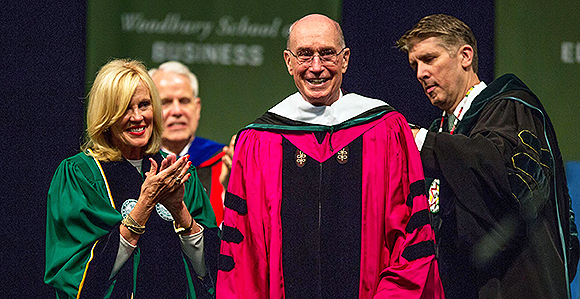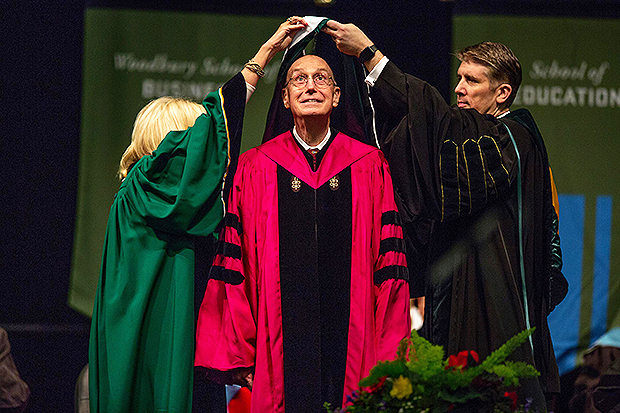Draw Courage from Accomplishments, President Eyring Tells UVU Graduates
Contributed By R. Scott Lloyd, Church News staff writer

President Henry B. Eyring, First Counselor in the First Presidency, is given an honorary degree by Utah Valley University president Matt Holland, right, during UVU’s commencement exercises in the UCCU Center in Orem, Utah, Thursday, May 4, 2017.
Article Highlights
- Education changes the way you see yourself and others.
- Education isn’t where you’ve been but what you can do.
“You have done hard things, more difficult than you thought you could do. Time after time, you have found that with sustained effort, you have surprised yourself with new power to do good things.” —President Henry B. Eyring
OREM, UTAH
While university commencement speeches typically focus on the future, President Henry B. Eyring chose a theme of retrospective appreciation as he addressed graduates and guests at the 76th annual commencement exercises of Utah Valley University on May 4.
“Generally the speaker is expected to urge the graduates onward to great accomplishment in a satisfying life, but it is a future that neither the graduates nor the speaker can clearly see,” observed President Eyring, First Counselor in the First Presidency. “More than that, the lessons the speaker thinks were learned through his or her long life may not apply to today’s graduates in the unseen future before them.
“So I will take the only safe route I can see today. I will point out what you have already learned in your education at this university. That will give you encouragement and advice enough, and I will have discharged my speaker’s obligation—so long as I keep it short.”
President Eyring, who was awarded an honorary doctorate of humane letters from the university during the commencement exercises, told graduates their university experience has changed them and the way they see themselves.
“You have done hard things, more difficult than you thought you could do. Time after time, you have found that with sustained effort, you have surprised yourself with new power to do good things,” he said. “You have discovered that you have gifts you didn’t know you had.”
The graduates have also changed in the way they see other people, he said, adding that they came to appreciate the unselfishness of those around them and to see them more as allies than competitors.
His father, renowned chemist Henry Eyring, urged him to study physics and mathematics as an undergraduate, he recounted. “He said that he saw great changes coming in technology that would reshape the world I live in.”
Along with others, his father gave him hard advice, telling him, “Hal, you’ll never amount to anything until you learn to work until your ears ring.”
“I discovered what you have learned in this university, that with hard, steady effort, you may expect to discover gifts you did not know were in you,” President Eyring said.
“You may remember, as I do, a teacher who saw promise in your imperfect efforts,” he remarked.
For him, that teacher was a distinguished economist to whom he turned in an examination paper on which one of the essay questions called for a description of the “multiplier effect” in an economy.
He did not know the answer but drew upon what little physics he knew to create a response to the question. The professor did not give him a failing grade, but rather, called him into his office.
“He said that he saw great promise in my creative and terribly wrong answer. He gave the paper the highest grade. But more important than the grade he gave was the way he changed how I saw my own potential to do things. I also saw in him a person who cared more about me than about economics, a discipline he dearly loved.”
President Eyring said the graduates may have had similar experiences to what he had with his father, who told him, “Hal, when you win, I win.”
Other advice he recalled from his father, given after President Eyring had been a student and teacher at four universities, was, “Hal, you have a problem. You think education is where you have been. Education is what you can do.”
Praising UVU, President Eyring said it has in its “very DNA the capacity to help people do things they thought were above and beyond their abilities.” He noted that the university began many years ago as a vocational school “where people were given confidence to do things that seemed too hard for them.”
“I have every confidence that this university will continue to grow in its influence to help people gain the power to do good things in spite of whatever obstacles they face,” he declared.
He said that in preparation for his remarks, he had asked university president Matthew S. Holland for information about the school. To his surprise, rather than quoting facts and figures about the university, President Holland sent him stories about some of the graduating students and other recent graduates.
“Every story was of a person who came here faced with challenges beyond any I have ever faced and yet who achieved beyond what he or she could reasonably have expected,” he noted.
Advising the students to undertake all future tasks with confidence and hard work, President Eyring counseled, “In the long run, and even in the middle run, the happiness that lasts will come as you feel the joy of those you loved and lifted—and as their happiness becomes your own.”
In his “presidential remarks,” President Holland focused on “a gleaming new object on campus,” a stained-glass exhibit unveiled last November to celebrate the university’s 75th anniversary and titled The Roots of Knowledge. It traces the history of human knowledge through more than 60,000 individual pieces of glass populating 80 panels. The exhibit gives tribute to human achievement in art, music, literature, engineering, medicine, science, religion, business, and government.
President Holland said individuals and achievements are woven together by intertwined roots and branches running along the top and bottom of the exhibit. He said that “highlights the way that knowledge always builds upon knowledge, that we all live together in a kind of intellectual, social ecosystem, constantly sharing and benefiting from ideas and inventions that cut across geographies and cultures.“
The largest university in Utah in terms of enrollment, UVU awarded 5,310 degrees during the commencement, mostly in behavioral science, business management, university studies, aviation science, communication, nursing, accounting, pre-professional health sciences and law, elementary education, and community health.
In addition to President Eyring, honorary doctorates were awarded in business to Keith Nellesen, cofounder of Vivant; in public service to Shirlee Silversmith, director of the Utah Division of Indian Affairs; and in education to Brent Wood, a businessman who has offered humanitarian resources and support relating to autism.

President Henry B. Eyring, First Counselor in the First Presidency, is given an honorary degree by Utah Valley University president Matt Holland, right, during UVU’s commencement exercises in the UCCU Center in Orem, Utah, Thursday, May 4, 2017. Photo by Hans Koepsell.
